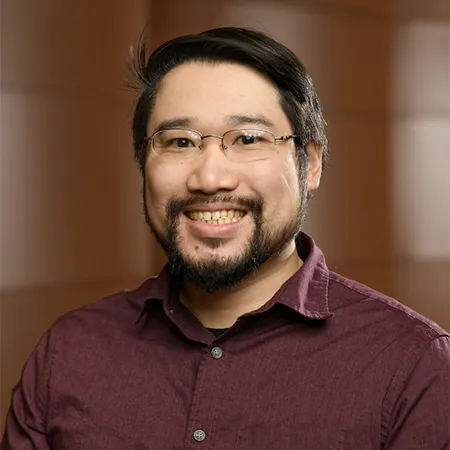
Leo Yan
Why are we here? What’s the meaning of life? These are questions Leo Yan tackles every day with students in his philosophy classes. Learn more about him in this installment of Meet Our Faculty.
What is it about the philosophy field that initially drew you in—and ultimately keeps you interested?
I was introduced to philosophy during my first semester of college. Before that, I didn’t really know anything about philosophy and had only some vague thoughts about it being something that people in togas used to do a long time ago in Greece. But I ended up in an interdisciplinary humanities class where I learned about what those ancient Greek philosophers were actually discussing, and I became absolutely hooked. By the end of the semester, I knew that I had to major in philosophy.
What drew me into philosophy were the deep questions it tackles. Questions like, “What do we actually know about anything, and how do we know it?” “How do we figure out right from wrong, good from bad?” “Why are we here, and what ultimately is the purpose of life?”
These were questions that I had thought about on my own even before college, but I had no idea that there was such a rich history and community of philosophers not only thinking through these very sorts of questions but also coming up with so many different, provocative, and fascinating possible answers. Studying philosophy has allowed me to take the time needed to really dive into these questions, come to fully understand different possible answers, and ultimately figure out my own view on them.
Why do you enjoy teaching in this discipline?
I love teaching philosophy, because I get to help students figure out for themselves not only what it is that they believe about these important questions, but also (and just as important) why they believe what they believe. Philosophy is not only about proposing answers to deep questions but also about giving clear and precise arguments as to why we should accept some answers over others.
I get to show students how to rationally engage with different positions by teaching them how to identify, reconstruct, and assess arguments. Moreover, my students can then take these same skills and use them to build their own valid arguments to better explain and logically defend their own views.
One of the most satisfying experiences I can have as a teacher is seeing my students develop their abilities to the point where they can clearly and precisely articulate their own views and be able to back them up with their own carefully constructed arguments. It gives me chills every time!
What advice would you give students about how to succeed in college?
The first thing I’d mention is that if you’re having any sort of problem in college, you are definitely not alone. Whatever it is that you’re facing, not only are there other students who are facing something similar, but there are countless people here at IUP to support you. Don’t be afraid to reach out to your navigator, advisor, professors, or any of the numerous student support services. We are all here to help you succeed at IUP and beyond!
Second, definitely go to your professors during their office hours. This is time we’ve specifically set aside to individually help you better understand the difficult material you’re learning. It is absolutely OK to be confused and have lots of questions. In fact, it is literally our job to alleviate your confusion and answer your questions, so make sure we do it!